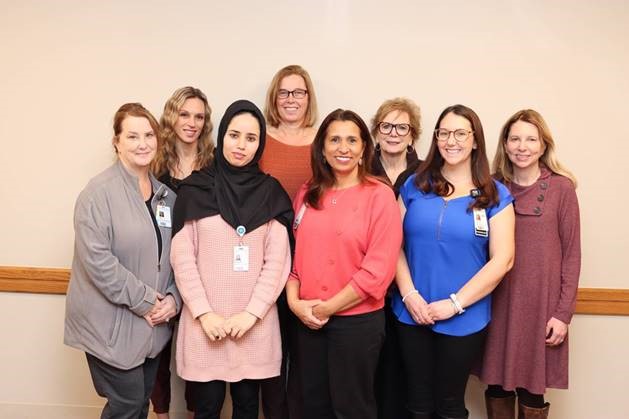Community
Southcoast Cares About My Diabetes Program

Southcoast Health is helping diabetes patients understand and manage their disease with the new Southcoast Cares about my Diabetes Program, a collaboration of the Certified Diabetic Education Program, Endocrinology, and Primary Care at Southcoast.
The goal is to help patients overcome any barriers that may exist to effectively controlling the disease and avoiding the worst complications.
Funded with a grant from Blue Cross Blue Shield and the Institute for Health Care Improvement, the program offers four-session workshops in easy-to-reach community settings to help people understand what diabetes is, the importance of managing it and how to do so. Pharmacists, certified diabetes care educators, dietitians and other professionals offer their expertise in English, with qualified interpreters delivering simultaneous translations in Spanish and Portuguese.
“We are bringing diabetes management and care to people where they need it,” said Katelyn Ferreira, Southcoast Health Equity Program Manager.
Diabetes is a leading cause of death in the United States, according to the Centers for Disease Control, and the No. 1 cause of kidney failure, lower-limb amputations and adult blindness. The Massachusetts Department of Public Health reports that cases of diabetes have more than doubled over the past two decades. Diabetes sends Black non-Hispanic patients to the emergency room more than four times as often as White non-Hispanic patients, and Black patients have more than twice the rate of diabetes-related mortality.
In the SE Massachusetts region, Southcoast Health has identified opportunities around control of diabetes, which results in high sugar, or glucose, in your blood and leads to organ injury. The heart, kidneys, blood pressure, cholesterol levels, feet, teeth and vision can all be affected. Understanding the disease and access to high quality care can make diabetes challenging to control.
Although there is no cure for diabetes, it can be controlled through high quality care including diet and exercise, daily monitoring of blood sugar, medications, and regular oversight by doctors, advance practitioners or diabetes educators.
The Southcoast Cares about my Diabetes program is designed to help patients navigate diabetes care, starting with assessing participants’ control of diabetes. A high HbA1C, which measures a person’s three-month average of blood glucose levels, is associated with a greater likelihood of complications. The program is designed for patients with an HbA1C of 8 or above, and family members are welcome and encouraged to participate and integrate learning into patients’ lives.
From there, participants learn the basics about diabetes, how controlling diabetes can improve overall health, and ways to achieve control. Participants learn how to manage their diabetes including components of nutrition, managing through acute conditions including infection, and how to be safe during travel.
“One ‘aha’ moment for many patients is when Kerry Wooten, a certified diabetic educator, demonstrates the amount of sugar found in popular drinks,” said Lindsay Dowd, RN, Southcoast Clinical Operations Manager. Patients also are sometimes surprised to learn about differences between statements like “no added sugar” and “no sugar” on labels.
The new program was first offered in New Bedford at the Boys and Girls Club and has now expanded to Fall River, with Wareham and Tiverton, Rhode Island to follow in early 2024. Classes are offered days, evenings, and weekends to accommodate patient schedules.
Lindsay notes that the Southcoast team has started to see program success in the reduction in HbA1c levels of the participants. Engaged participants had an average A1C of 9.3 before they began participating in the program; at the most recent test after engaging with the program, participants had an average A1C of 8.8. For Katelyn, the classes are just one way to address disparities in health care that vulnerable populations experience.
“We have so many opportunities to improve care for people with diabetes, but we must wrap our arms around inequities in access to and delivery of care as well as the disparate outcomes for many communities,” says Dr. Dani Hackner, Chief Clinical Officer of Southcoast and co-sponsor of the program. “There are practical, collaborative approaches to addressing care in diabetes and one of the keys is speaking to people in their own language and in their community.”
Pictured in the header image: Front row: Lori Choquette, Endocrinology Manager; Khalida Hakimi, CHW-Medical, Erica Thomas, Pharm Tech; Casey Souza, PharmD; Amy Anderson, MD, Medical Director Endocrinology Back row: Brittany Soucy, Pharm Tech; Kerry Wooten, CDCES; Lindsay Dowd, RN,CCM
Learn more about the Southcoast Health Cares About By Diabetes Program at Diabetes Management Program MA & RI | Southcoast Health.
